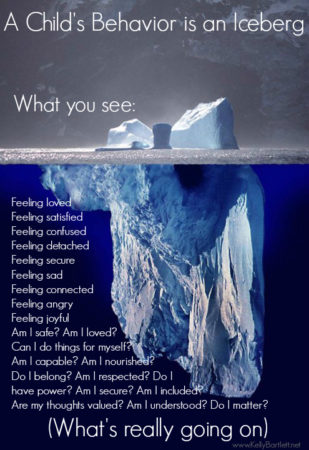
Children won’t say “I had a hard day…”
Children won’t say “I had a hard day, can we talk?” They say “will you come play with me?”
You may have seen this quote on social media recently. We, at Ducklings, found this very powerful!
Young children may ask for help, support or someone to talk to in very different ways than adults. It’s important for parents and caregivers to be aware of a child’s needs, even when they cannot articulate them. We like the “iceberg” analogy. A child’s behavior is like an iceberg. What you SEE (the behavior) is just the tip of the iceberg. The feelings and needs of the child are all under the surface (see image below). So, when a child asks you to play with them, it may be a request for connection, for someone to listen to them, or to feel valued. When a child throws a temper tantrum, they may be feeling overwhelmed, angry or even tired.
Talking to young children can be challenging and identifying their underlying emotions and needs can be even tougher! When we ask children questions, their responses are often short and vague. When you ask “how was your day?” the child’s response may be “fine.” Or you may ask “what did you do today?” with the response of “nothing” or “I don’t know.” Don’t give up! There are some tricks to having more meaningful conversations with young children.
Look them in the eyes– Get down on their level or bring them up to yours (on your lap, for instance).
Be specific– Refer to something they did that day. If your child’s school uses a parent communication app, like Tadpoles or Brightwheel, use that information as a guide when you ask your child about their day. If not, try asking the teacher for a glimpse into their day. If all else fails, bring up something you know they do everyday. Try something like, “what did you do when you went outside today?”, “which did you like better, circle time or centers?” or “who did you play with today?” There are additional question ideas and conversation starters below.
Don’t interrogate– Have a casual conversation with them instead. Too many questions at once can be overwhelming.
Be mindful of your screen use– When you are talking with your child, try your best to put your phone or tablet down. This will show your child you care about what they are saying and are fully engaged in the conversation.
10 Questions and Conversation Starters
- Tell me about the best part of your day.
- What made you feel happy today?
- What was the hardest thing you had to do today?
- Did anything happen that made you feel sad or angry?
- Can you tell me or show me something you learned (or did) today?
- Did anyone do anything nice for you today? What was the nicest thing you did for someone else?
- Tell me about the art project you did today.
- Did you read any books or sing any songs today?
- What was the silliest or funniest thing that happened today? What made you laugh?
- Do you have any questions for me?
Additional Resources
Small Talk: How to Get Your Kid to Chat About Their Day
Age-by-age Guide to Getting Your Kids to Talk
5 Ways to Help Young Kids Communicate Their Emotions

